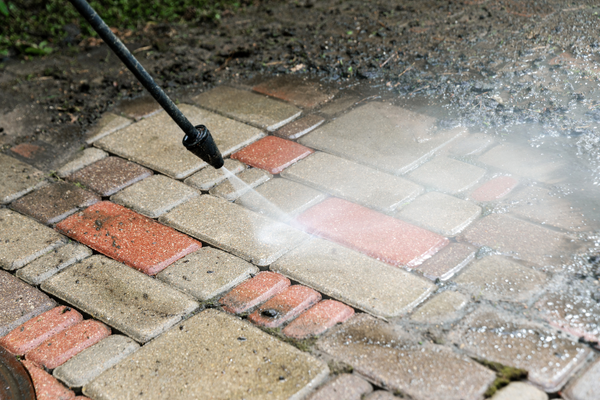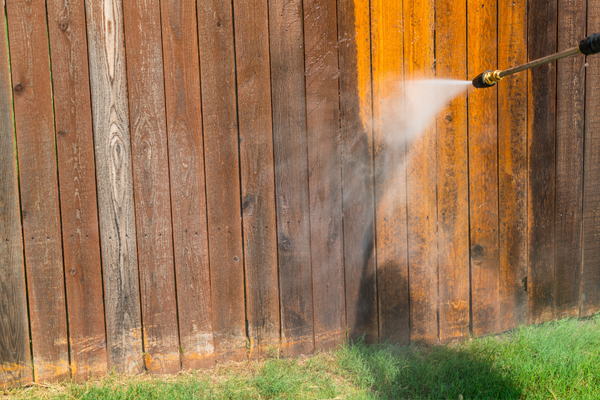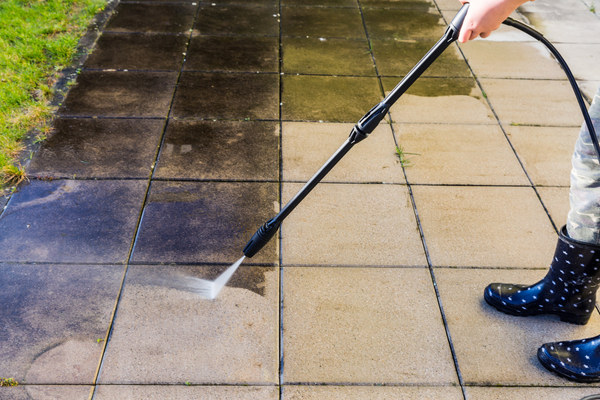There is a unique satisfaction that comes from watching years of accumulated grime and dirt wash away from a home’s siding or a driveway. The power of a pressure washer can instantly restore the beauty and curb appeal of a property, making it look fresh and new. That powerful stream of water, while effective, carries with it potential risks. Improper use can lead to property damage, personal injury, and harm to the local environment. Many homeowners are unaware of the hidden dangers lurking in common practices.
This guide provides the essential knowledge for eco-friendly and safe pressure washing. You will learn how to achieve a brilliant clean without the negative consequences. We will explore everything from choosing the right plant-safe cleaners to properly protecting your landscaping and, most importantly, yourself. Following these pressure washer basics will give you confidence and peace of mind.
What is Eco-Friendly Pressure Washing?
Eco-friendly pressure washing is a cleaning method that prioritizes the health of your family, pets, and property. It involves using non-toxic, biodegradable cleaning solutions, conserving water, and employing techniques that protect plants, animals, and local Rock Hill waterways from dangerous chemical runoff.
This environmentally friendly pressure washing solution is built on several key pillars that distinguish it from conventional methods. Adopting these practices makes your cleaning project responsible and sustainable.
- Using Biodegradable & Plant-Safe Cleaners: The foundation of an eco green pressure washer approach is the choice of cleaning agents. Instead of harsh chemicals like bleach, this method uses solutions that break down naturally without harming the ecosystem.
- Minimizing Water Consumption: While it seems counterintuitive, a pressure washer can use significantly less water than a garden hose to achieve the same result. Eco-friendly practices involve using the correct nozzle and technique to clean efficiently, reducing overall water usage.
- Protecting Landscaping and Wildlife: Your garden, pets, and local wildlife are vulnerable to the chemicals and high-pressure spray. Green power washing includes steps to shield your yard and its inhabitants from harm.
- Properly Managing and Containing Water Runoff: The water used in the cleaning process has to go somewhere. Responsible pressure washing involves directing this runoff away from storm drains, which often lead directly to rivers and streams, preventing pollution.
- Choosing the Right Equipment Settings: Not all surfaces are created equal. A crucial part of eco-friendly and safe cleaning is adjusting the pressure (PSI) and using the correct nozzle for each material to prevent gouging wood, stripping paint, or etching concrete. The team at Carolina Power Washing has seen the damage that incorrect settings can cause.

Table of Contents
What Cleaning Solutions Are Safe for Plants and Pets?
The cleaning solution, or soap, is one of the most critical choices in the process. Many common pressure washing chemicals are effective because they are caustic, but this same property makes them dangerous to living things. Choosing a cleaner that is both effective and safe is entirely possible.
Why should you avoid chlorine bleach for pressure washing?
Chlorine bleach is a common recommendation for cleaning mold and mildew, but it should be avoided for exterior washing. Bleach is highly toxic to almost all plants, causing chemical burns to leaves and killing root systems upon contact. When it seeps into the soil, it can contaminate groundwater. The runoff is exceptionally harmful to fish and other aquatic life. On top of its environmental impact, bleach can damage the surface of your home. It can cause vinyl siding to become brittle and discolored and can prematurely age and splinter wood decks and fences.
What are the best biodegradable pressure washer detergents?
There are many excellent, commercially available biodegradable detergents. These products are formulated to be tough on dirt but gentle on the planet. Here are some types of green cleaning agents and their common uses.
- Oxygen-Based Cleaners (e.g., OxiClean): These cleaners use sodium percarbonate, which releases oxygen bubbles to lift stains and kill mold and mildew. They are a fantastic, non-toxic alternative to bleach and are safe for most surfaces.
- Citrus-Based Cleaners: Containing d-Limonene, a natural solvent derived from citrus peels, these cleaners are powerful degreasers. They are perfect for tackling greasy barbecue spots on the patio or stubborn oil stains on driveways and garage floors.
- Vinegar Solutions: Acetic acid, the active ingredient in vinegar, is a mild acid that can effectively treat light mildew and algae stains, especially on concrete and brick. It is a simple and widely available option.
- Simple Soap/Detergents: Look for products specifically labeled as “biodegradable” and “non-toxic.” These are often plant-based and formulated to break down quickly and safely in the environment.
Can you make a DIY eco-friendly pressure washer cleaner?
For light-duty cleaning tasks, a homemade solution can be quite effective. A common DIY pressure washing recipe involves mixing water, distilled white vinegar, and a small amount of biodegradable dish soap. The soap acts as a surfactant, helping the cleaner cling to the surface, while the vinegar works on the grime. A typical ratio is about one cup of vinegar and a few drops of soap per gallon of water.
A word of caution: this type of solution is best for light atmospheric dirt and some minor organic growth. Its effectiveness is limited for heavy-duty jobs. Always test any homemade cleaner, including this one, on a small, inconspicuous area of the surface first to check for any adverse reactions like discoloration.

What Are the Most Important Safety Rules for Pressure Washing?
A pressure washer is a powerful tool, not a toy. The water stream it produces is strong enough to cause serious injury and significant property damage. Approaching the task with a safety-first mindset is non-negotiable. With over decades of experience, the experts at Carolina Power Washing have made safety a core part of every project.
What is the proper Personal Protective Equipment (PPE) for pressure washing?
Before you even start the machine, you must be wearing the correct safety gear. This equipment protects you from the most common risks associated with everyday pressure washing.
- Safety Goggles: Water and detergent can splash back into your face. More dangerously, the high-pressure stream can kick up small rocks, wood splinters, and other debris at high velocity. Goggles are essential to protect your eyes.
- Gloves: A good pair of work gloves provides a secure grip on the vibrating wand and protects your hands from contact with cleaning solutions.
- Closed-Toe, Non-Slip Boots: Your work area will be wet and slippery. Sturdy, waterproof boots with non-slip soles are critical to prevent falls. They also protect your feet from the high-pressure spray, which can easily cut through skin.
- Hearing Protection: Gas-powered pressure washers are very loud and can cause hearing damage with prolonged exposure. Foam earplugs or over-ear muffs are a necessity.
- Long Pants: Never operate a pressure washer while wearing shorts. A simple slip of the wand can cause the high-pressure stream to hit your leg, causing a serious laceration.
How do you operate a pressure washer without damaging property?
Knowing a few power washing tips and tricks for operating the machine correctly is the key to a clean that enhances your property, rather than harms it. Damage from improper use is very common.
- Start with the Widest Nozzle Tip: Pressure washer nozzles are color-coded. Begin with the 40-degree (white) or 25-degree (green) tip. These provide a wide, fan-like spray that is gentle on surfaces. Only move to a narrower, more powerful tip if absolutely necessary.
- Maintain a Safe Distance: Start with the tip of the wand about 3-4 feet away from the surface you are cleaning. You can slowly move closer if the grime is not coming off, but starting too close can instantly cause damage.
- Use a Sweeping Motion: Keep the wand moving in a consistent, overlapping sweeping motion. Holding the spray in one spot for too long will concentrate the pressure and can leave ugly lines or etch marks on wood and concrete. For a complete refresh of your home’s exterior, it’s often best to call a professional for house washing.
- Avoid Spraying Windows Directly: The intense pressure can easily break a window or damage the seals around the glass, leading to foggy panes filled with moisture. Wash around them carefully.
- Steer Clear of Electrical Fixtures: Water and electricity do not mix. Cover all outdoor electrical outlets, light fixtures, and air conditioning units with plastic. Be constantly aware of any overhead power lines as you move the wand.

How Do You Protect Your Yard and Landscaping During Pressure Washing
A clean house sitting in the middle of a damaged, brown yard is not a good look. Protecting your landscaping is a vital part of an eco-friendly power washing project. A little preparation goes a long way.
What is the best way to protect plants from pressure washer runoff?
Your plants are particularly vulnerable to both the force of the water and the cleaning solutions. Taking these protective steps is one of the most important pressure washing tips for house care.
- Pre-Soak Everything: Before you begin, use a gentle setting on a garden hose to thoroughly water down all plants, shrubs, grass, and soil in and around the work area. When plant leaves and the ground are already saturated with clean water, they are far less likely to absorb any chemical overspray or runoff.
- Cover with Plastic Tarps: For very delicate plants, flowers, or vegetable gardens located directly beneath the area you are washing, cover them with lightweight plastic sheeting. This provides a physical barrier against the cleaning solution. Remove the tarps as soon as you are done to allow the plants to breathe.
- Rinse Afterward: Once the job is complete, give all the vegetation in the area another gentle rinse with clean water. This will wash away any detergent residue that may have drifted onto the leaves.
How can you control and contain water runoff?
Controlling where the dirty water flows is important for protecting your local environment. Most storm drains in Rock Hill, SC, flow directly into local streams and rivers without being treated. Sending a flood of detergents and grime into those drains harms the local ecosystem. Stubborn stains on your driveway may need specialized concrete cleaning services to manage runoff correctly.
You can use temporary barriers like sandbags or plastic sheeting to create a dam that diverts water away from storm drains. The ideal place for runoff is a lawn, gravel bed, or other permeable surface where the water can be absorbed and naturally filtered by the soil. For large-scale jobs, a professional service like Carolina Power Washing might use water reclamation systems that capture, filter, and reuse the water.
Conclusion:
Achieving a beautifully clean home exterior does not require you to compromise on safety or environmental responsibility. The central message is that preparation is everything. Choosing a gentle, biodegradable cleaner, wearing the proper protective gear, and taking a few moments to protect your surrounding landscape are the ingredients for a successful project. These pressure washer basics transform a potentially hazardous task into a safe and rewarding one.
What are your favorite eco-friendly cleaning tips? Share them in the comments below!
For a professional touch that guarantees the safety of your property and a brilliant finish, speak with the experts at Carolina Power Washing. Don’t forget that a clean house looks even better with clean gutters, and we offer expert gutter cleaning solutions. For larger commercial jobs, we are also the trusted local choice for exterior building cleaning in Rock Hill.

